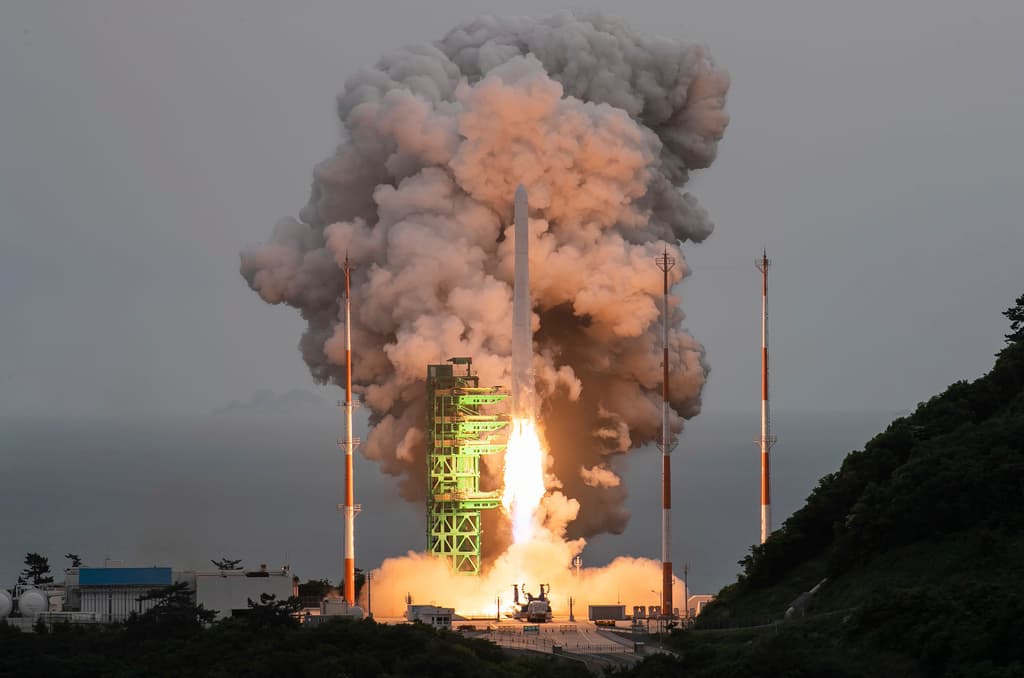Space Race Heats Up on Korean Peninsula With Launch of Seoul’s First Spy Satellite
The American Space Force unit, headquartered at Osan Air Base south of Seoul, is counting on South Korean satellites to complement Washington’s own satellites monitoring the North’s nuclear and missile program.

South Korea has beaten the North Koreans in the space race by putting the peninsula’s first home-made spy satellite into orbit while the new American Space Force teams up with Seoul at its first overseas base.
The American Space Force unit, headquartered at Osan Air Base south of Seoul, is counting on South Korean satellites to complement Washington’s own satellites monitoring the North’s nuclear and missile program.
South Korea’s success bolsters its efforts to partner with America against North Korean threats to launch missiles tipped with nuclear warheads at targets in both the South and Japan as well as North America.
North Korea’s leader, Kim Jong-un, has inspected the North’s launch site and is expected to order his country’s satellite launch whenever his engineers are ready, saying its own eyes in the skies are needed to see what its enemies are doing.
The launch of the South Korean satellite, capable of relaying images for commercial purposes, not only shows the superiority of the South’s technology but makes it a contender for launching other countries’ satellites.
In an interview with the South’s Yonhap News, a professor at the Korean Advanced Institute of Science and Technology, Kwon Se-jin, said, “We can have our foreign customers and carry their satellites to space like other space powers such as the United States.”
The launch of the satellite comes as a blow to North Korea after the North’s state media publicized pictures of Mr. Kim inspecting what was called “military reconnaissance satellite No. 1.”
A sure sign of the priority Mr. Kim gives the project is that his state media showed him with his tween-aged daughter, Ju-ae, who’s also been at his side viewing missile launches and parades.
Pyongyang’s Korean Central News Agency reported on May 16 that the satellite was “ready for loading after undergoing the final general assembly check and space environment test.” KCNA in December said the satellite had undergone an “important final stage test.”
South Korean officials and analysts attached greater importance to the commercial than the military significance of its satellite, called Nuri, meaning world.
“The latest success of Nuri,” Yonhap said, “verified South Korea’s capability to operate a space vehicle to carry payload satellites into target orbit and cemented its status as a space power since its first science observation rocket in 1993.”
The South’s science minister, Lee Jong-ho, said the launch confirmed “our potential for launch services for various satellite operations and space exploration.”
As in other Korean commercial endeavors, ranging from semiconductors to motor vehicles to ship-building, Korean engineers showed determination in developing Nuri — at a cost estimated at $1.5 billion so far — despite some setbacks.
Two previous launches from the same site near the southern coast wound up in disappointment. Two years ago, all was going as planned as the rocket soared 434 miles into the sky.
Then came the disappointing news. The dummy satellite that was supposed to go into orbit had failed. This time the rocket, at an altitude of 340 miles, released eight satellites, one of which was “commercial grade.”
Back on earth, American and South Korean forces staged their biggest live-fire exercise in at least six years. The war games, conducted 15 miles below the North-South line, celebrated the Korean-American alliance that was formed 70 years ago and also the 75th anniversary of the founding of the South Korean armed forces two years before North Korean troops invaded the South.
More importantly, they dramatized the reversal of policy under President Yoon, a conservative, after his liberal predecessor, Moon Jae-in, sought unsuccessfully to draw Mr. Kim into dialogue.
Mr. Kim saw Mr. Moon three times in 2018 but refused to see him again after President Trump broke off his summit with Mr. Kim at Hanoi in February 2019.
Yonhap, reflecting the shifting policy, said “the massive showcase of the allies’ landpower and aerial prowess” was in line with Mr. Yoon’s “oft-repeated mantra of peace through overwhelming military superiority as opposed to ‘fake peace’ that hinges on the other party’s good will.”

